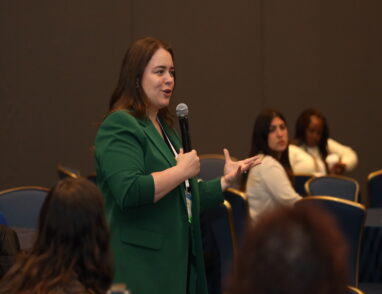Three Stories Illuminate How to Improve Health Equity
March 21, 2024 · Andy Reynolds
NCQA Director of Health Equity Dr. Bryan O. Buckley’s remarks to open day 2 of the Health Equity Forum were a highlight of that first-of-its kind event.
Bryan highlighted three stories that taught him:
- Why health equity—giving everyone the chance at optimal health—matters.
- How to advance health equity.
Visits to Grandma’s House
Bryan’s first story involved visits to his grandmother, a teacher and school principal in an Antiguan village. During these visits, Bryan and his sister got to talk with and know the village’s residents, and to learn about their lives and struggles.
These experiences emphasized the importance of:
- Relationships (build rapport with your community).
- Empathy (cultivate understanding of challenges people face).
- Humility (recognize and respect the value of different traditions).
Bryan’s Bottom Line: Go beyond traditional, obvious approaches. Engage the people you aim to serve, understand their needs and build trust.
Skydiving Into the Unknown
Bryan equated skydiving with plunging into health equity work. Both require preparation (research, training, planning)—and both demand collaboration.
Tandem skydiving (an instructor is harnessed to a student) is a team effort: You’re not alone when you take that scary step out of the safety of a plane into thin air. And when you leap into health equity work, you lean on others.
When floating to earth, skydivers are wise to take in the scenery—a reminder for “Justice League” members fighting for health equity to keep perspective.
Fellow skydiving students cheer at each successful landing. Bryan cited this as a reminder to celebrate small wins (acknowledge progress and milestones) to maintain the motivation needed in the long fight for health equity.
Bryan’s Bottom Line: Know that improving health equity is hard. Collaborate with your team, celebrate successes along the way, keep the big picture in mind.
A Grandfather’s Legacy
Bryan’s third story was about his grandfather, who bucked family tradition by getting screened for prostate cancer—becoming the only one of 13 brothers to not die of that disease.
An attentive doctor, aware of disparities in cancer screening, identified Bryan’s grandfather as someone who needed screening and convinced him to get it.
That doctor’s life-saving intervention reverberates across generations: Not only did Bryan’s grandfather live to see Bryan earn his doctorate, he lived to meet Bryan’s son—his great grandson.
This ripple effect of just one equity-enhancing intervention is a reminder that we should use our privilege to improve the world and help future generations. Our decisions must consider long-term welfare by emphasizing equity, sustainability and justice.
(Our HEDIS measure, Non-Recommended PSA-Based Screening in Older Men, guards against unnecessary screening. The measure reduces indiscriminate testing, so it remains available for people like Bryan’s grandfather, who clearly benefited from it.)
Health equity isn’t only about closing gaps, it’s about saving lives. Bryan emphasized the importance of having a passion for change (be persistent in pursuing a more equitable system).
Bryan’s Bottom Line: Advocate for change within the health care system. Identify and address biases that create health disparities.
These three stories teach lessons that are valuable both in life and in fighting for health equity. We need compassion (recognize the inherent value of each individual), grit (perseverance in the face of challenges) and collaboration (work together to achieve shared goals) in achieving health equity. We all have a role to play in creating a more just and equitable society.
Read other takeaways from the Health Equity Forum.







